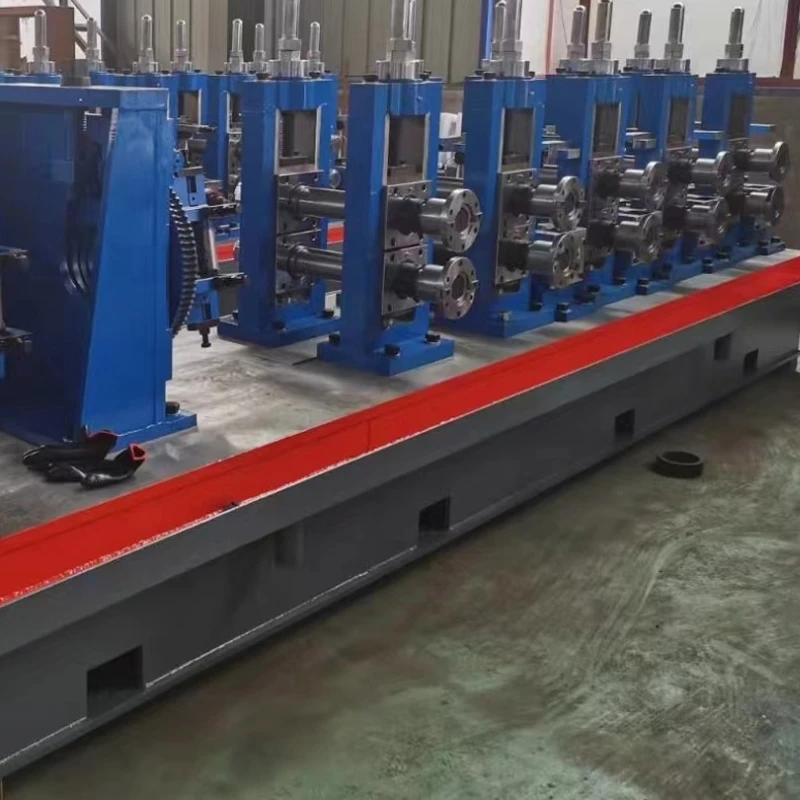Hollow Pipe Fabrication Equipment for Efficient Manufacturing Process
The Process and Benefits of Hollow Pipe Making Machines
In the realm of manufacturing and construction, hollow pipes play an essential role across various industries, including plumbing, construction, and automotive. The production of hollow pipes has evolved significantly with advancements in technology, leading to the development of specialized machinery designed for efficient pipe making. Hollow pipe making machines not only streamline the production process but also enhance the quality and consistency of the final product.
Understanding Hollow Pipe Making Machines
Hollow pipe making machines are sophisticated pieces of equipment specifically engineered to produce hollow pipes from different materials, typically metal or plastic. The machinery can execute various processes including cutting, bending, and welding, allowing for the seamless creation of pipes in different diameters and lengths. These machines come in various forms, from simple extruders for plastic pipes to advanced CNC (computer numerical control) units for metal pipes, showcasing the versatility and adaptability of modern manufacturing.
The Manufacturing Process
The general process of making hollow pipes involves several key steps
1. Material Selection The type of material to be used for hollow pipes is chosen based on the intended application. Common materials include PVC, polyethylene, steel, and aluminum, each possessing unique properties that suit different environments and uses.
2. Pipe Formation Depending on the type of machine, the process may begin with extrusion, where raw material is melted and forced through a die to form a hollow shape. For metals, a combination of rolling and welding techniques is used to ensure uniformity and strength.
3. Cutting and Sizing Once the hollow pipe is formed, it is then cut to the desired length. Precise measurements are crucial, and modern machines are equipped with automated systems that ensure accurate cuts every time.
4. Welding and Finishing In cases where the pipe is made from metal, the edges are typically welded together to provide structural integrity. This is followed by a finishing process, which may include coating or polishing to enhance durability and aesthetic appeal.
hollow pipe making machine

5. Quality Control Throughout the manufacturing process, quality control is paramount. Machines are often equipped with sensors and monitoring systems that check for defects, ensuring that only high-quality pipes are delivered to the market.
Advantages of Using Hollow Pipe Making Machines
1. Efficiency Automating the pipe-making process significantly reduces production time. Machines can operate at higher speeds compared to manual labor, allowing manufacturers to meet large orders without compromising on quality.
2. Consistency and Quality One of the primary advantages of using specialized machinery is the consistency of the output. Machines can replicate the same process accurately, ensuring that every pipe meets the required specifications and standards.
3. Reduced Labor Costs Although the initial investment in hollow pipe making machines may be substantial, the long-term savings on labor costs are significant. With machines handling most of the work, companies can reduce overhead costs and allocate human resources to more complex tasks.
4. Customization Many modern hollow pipe making machines offer advanced customization options. Manufacturers can easily adjust parameters to produce pipes of varying diameters, lengths, and designs, catering to specific customer needs.
5. Sustainability With growing emphasis on eco-friendly practices, many machines are now designed to minimize waste and energy consumption. For example, they can recycle excess material, contributing to a more sustainable production process.
Conclusion
The evolution of hollow pipe making machines has transformed the manufacturing landscape. With their ability to produce high-quality, consistent products at a rapid pace, these machines have become indispensable in various industries. The benefits of efficiency, reduced labor costs, and customization options make them a valuable investment for manufacturers looking to stay competitive in a rapidly changing market. As technology continues to advance, we can expect hollow pipe making machines to become even more sophisticated, driving further innovations in pipe manufacturing and paving the way for eco-friendly production practices.
-
High Frequency Straight Seam Welded Pipe Production Line-BzZhou Xinghua Machinery Equipment Manufacturing Co., LTD.|Precision Welding, High EfficiencyNewsJul.30,2025
-
High Frequency Straight Seam Welded Pipe Production Line|BzZhou Xinghua|Precision Welding&EfficiencyNewsJul.30,2025
-
High Frequency Straight Seam Welded Pipe Production Line - BzZhou Xinghua|Precision Engineering&EfficiencyNewsJul.30,2025
-
High-Frequency Straight Seam Welded Pipe Production Line-BzZhou Xinghua Machinery Equipment Manufacturing Co., LTD.NewsJul.30,2025
-
High-Frequency Straight Seam Welded Pipe Production Line-BzZhou Xinghua Machinery Equipment Manufacturing Co., LTD.|Precision Manufacturing, High EfficiencyNewsJul.30,2025
-
High Frequency Straight Seam Welded Pipe Production Line-BzZhou Xinghua Machinery Equipment Manufacturing Co., LTD.|Precision Steel Pipe Manufacturing&Industrial EfficiencyNewsJul.29,2025


